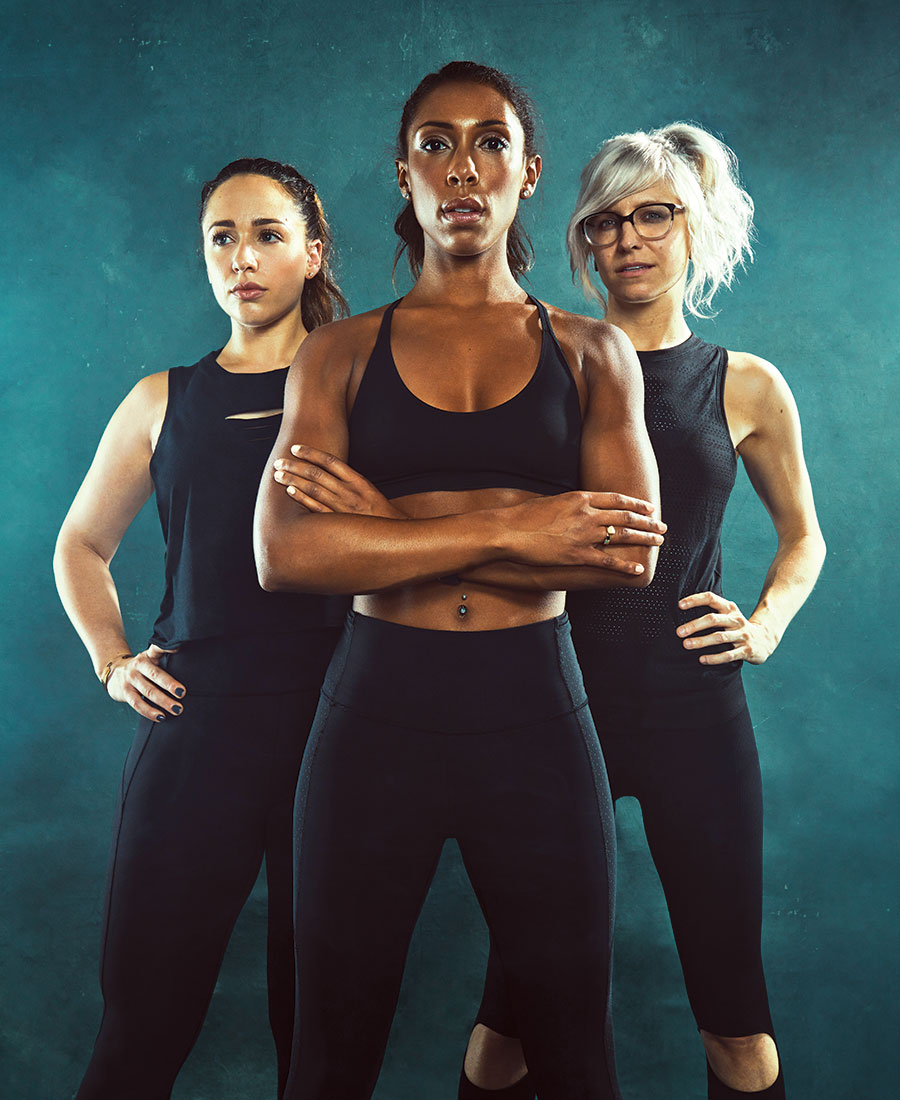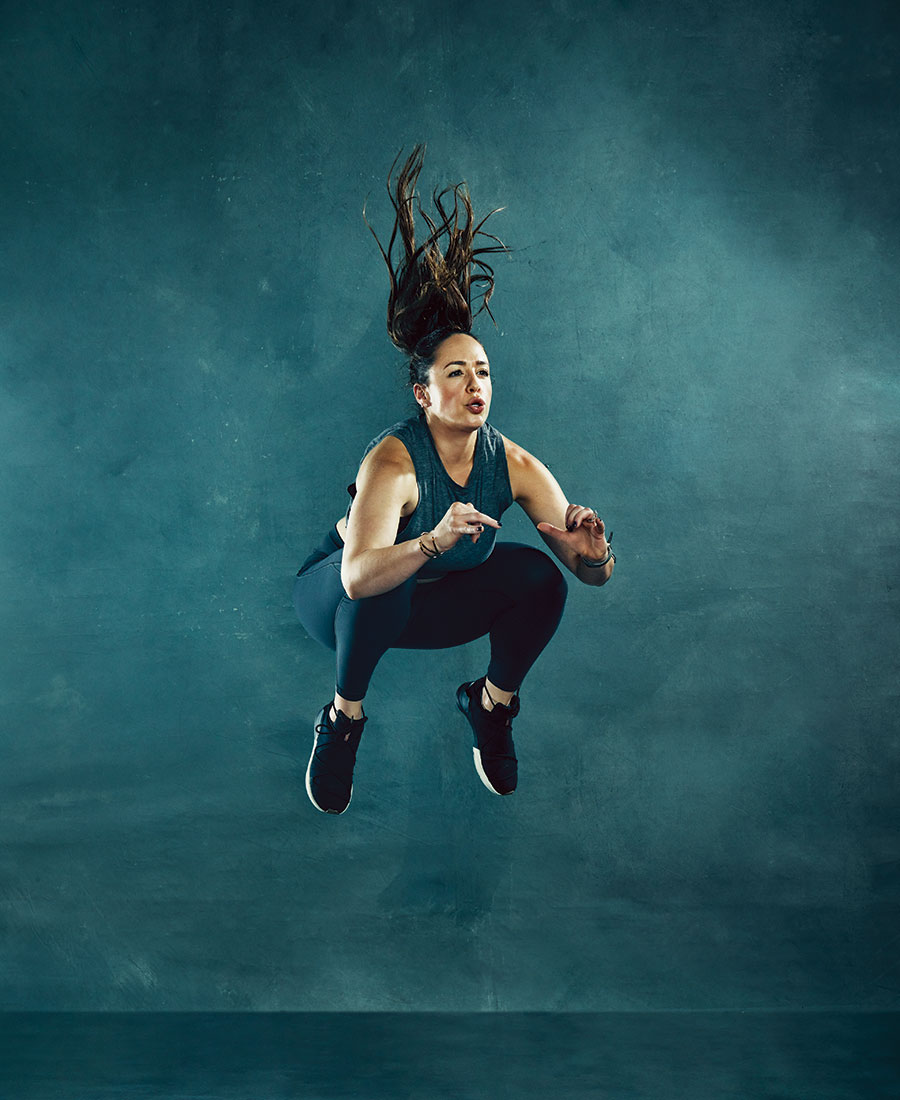Daydreaming About Quitting Your Job to Become a Spin Instructor? Read This First.
Inside the secret (and insanely stressful) lives of Philly fitness trainers.

From left: Shoshana Katz, Jayel Lewis, and Amandah Povilitus — three of Philly’s most-loved instructors. | Photo: Stevie Chris
I can hear Shoshana Katz shouting from the lobby of the gym. She screams a couple of words I can’t repeat here, and I eventually find her standing — long brown hair piled into a messy bun, white leggings and tank top damp with sweat — in the women’s bathroom. At her feet, a giant puddle seeps across the concrete floor. There’s brown stuff bobbing in the water, and the air smells like a clogged toilet.
It’s 8:49 a.m. on a Wednesday in May, and there’s sewage everywhere. Again.
Katz, 29, is — unfortunately for her at this moment — the owner of BPM Fitness, a studio she opened in Spring Garden in November. BPM isn’t just any old indoor cycling gym; the workouts fuse cycling with circuits and strength training, a program that Katz spent nine months custom-designing to set it apart from every other place in town.
Like most boutique studios these days, Katz’s place is heavily branded. A giant “BPM” covers a wall inside the circuit training room. The slogan “Built on Sweat. Fueled by Heart” stretches across the back of the cycling studio, and there are racks of BPM-emblazoned gear in the lobby. Class names (“The Circuit Breaker,” “The Roots”) are trademarked. The bathrooms are stocked with amenities you’d find at a chic hotel, and the bikes in the cycling room are top-of-the-line. BPM isn’t just selling a workout; it’s offering an experience.
And right now, Katz’s experience is mopping crap off the bathroom floor before a client discovers that the $25 she paid for class won’t include a clean place to pee.
“Doesn’t life know I have shit to do?” Katz asks the air before getting on her hands and knees with a tub of Clorox wipes. She cleans with one hand and dials up her dad with the other. He’s BPM’s financial backer and a part owner. He also knows a good plumber.
On this Wednesday, as on most days, Katz has been at work since 5:30 a.m. Even without the plumbing fiasco, she has a heck of a schedule ahead of her: She’ll teach two classes — one in another location across town — set up her studio for two more, spend some desk time on emails and programming, see four personal-training clients, take a conference call about an event, and keep tabs on the plumber. Her day won’t end until after 8 p.m.
Katz swears this isn’t typical, but, well, it kind of is. Maybe sewage isn’t always involved (or a fire alarm, which, yeah, also happens this day), but for a studio owner trying to make a living in the fitness industry, running around and juggling a packed schedule is the norm.
And “trying to make it in the fitness industry” is now a viable career option. Health clubs have become a $30-billion-a-year business in the U.S., and you’d have to be living under a rock not to notice that our fitness scene has gone full-in. Philly’s first indoor cycling studio opened in Rittenhouse in 2010. Now, the number of boutique gyms in that neighborhood alone has reached double digits; there are five barre studios within five blocks of one another. The ’burbs aren’t immune; in a mile-long stretch of Bryn Mawr, you’ll find six boutique studios, plus a couple places for personal training.

Philadelphia fitness instructor, Shoshana Katz. | Photo: Stevie Chris
All this competition means that businesses have to hustle hard for their customers. It’s not enough just to provide a decent workout anymore — gyms need the best showers, the most immersive branding, the most eye-catching routines, and the most enviable front men: instructors.
Fitness instructors are today what celebrity chefs were 10 years ago. They’re the young, hot talent we can’t stop talking about, the people we’ll follow from studio to studio — the way we followed those chefs from restaurant to restaurant — to watch them perform. The reasons for our obsession are obvious: Their bodies are beautiful, they always look happy, they own the cutest athleisure, and they spend their days exercising while the rest of us sit in fluorescent-lit offices and bitch about how we never have time to work out. Their thousands of followers on Instagram want to know everything about them — from what they eat for breakfast to where they got that sports bra — and it’s common for them to get asked to speak at events and rep national brands. In fitness trainers, we see the kind of people we could be if we exercised more, ate better, and spent more time meditating.
But the reality is, more times than not, our idols find themselves standing ankle-deep in a pool of shit. Behind all those smiling photos and chiseled physiques are people who are just as anxious, exhausted and overworked as the rest of us. While it’s their job to help us live healthy, balanced lives, the demands of their industry make it nearly impossible for them to do so themselves.
But still, they love it. And so they keep trying.
My legs are begging me to quit, but I’m totally, completely under Katz’s spell. She’s dancing like no one is watching, though she’s actually in the center of the studio; her lunchtime spin class at the Sporting Club at the Bellevue was so popular today that she gave her instructor’s bike to a participant. She shimmies around the room, singing along to the music, showing off in ways that have absolutely nothing to do with the cycling class she’s teaching.
I can’t take my eyes off her. I find myself wishing I was that self-assured, that happy in my skin. So I pedal a bit harder.
Katz, who grew up in Abington, has always been a performer. She started emceeing bar mitzvahs when she was 18, and earned a theater degree from the University of the Arts in 2011. In college, she started taking spin classes — at the Sporting Club, coincidentally. There, she met Russell Carter, who told her he was opening a spin boutique called Body Cycle Studio in Rittenhouse Square — one like those SoulCycle places that had everybody in New York talking. Katz, who didn’t want to end up waiting tables like the rest of her theater friends, decided to get her spin certification.
Being a successful fitness instructor is as much about putting on a good show as it is about muscle tone. “I have so much fun when I teach. It gives me the opportunity to pull that inner performer out and be able to escape for an hour,” says Katz. “There are definitely days where I’m like, I’m fucking tired and I don’t want to do this, but I get started and I get out of my funk.” For their part, clients want to be entertained; they yearn to step into a studio and forget about their lives for an hour, to come out feeling clearer than they did before.
Katz says it’s this adrenaline that keeps her going, along with those grounding moments that remind her she’s having an impact on people’s lives. She tells me about a time a client showed her a bracelet she’d had engraved with one of Katz’s personal mantras: “Don’t give up on you.”
“She looked at me and said, ‘Never forget what you do for people. I keep you close to me every day.’ I lost it — lost my shit and just started crying,” says Katz.
She isn’t the only one with stories like this. Jess Sullivan, a popular Center City spin instructor and personal trainer, recalls helping a client who nearly passed out during a class and the long, flattering email the woman sent to Sullivan’s boss afterward. “Every time you’re really exhausted and you’re at that breaking point, someone tells you, ‘Hey, you’re really making a difference.’ And you go, ‘Oh yeah, that’s right. That’s why I do this,’” Sullivan says.
It’s a good thing they feel validated, because they can’t be in it for the money. Katz owns her business, but she also trains private clients and teaches elsewhere — oh, and she still emcees the occasional bar mitzvah — to bring in enough cash to cover her half of the mortgage on her Point Breeze home. One full-time personal trainer tells me that in her first year of coaching, she worked 60 hours a week and took home less than $40,000 — and there’s no health insurance, no vacation days, none of the benefits you get in a salaried job. Seven years later, she makes almost twice that but still hustles just as hard. And there’s no guarantee as to what these instructors take home week-to-week, because clients can be unreliable.
For those who are teaching classes, the situation is even less stable. Instructors do bop around to different gyms, looking for the highest bidder. Sullivan remembers getting paid $12 a class at the YMCA, but at higher-end studios, you can make as much as $100 per session. Popular instructor Amandah Povilitus (whose large-frame glasses and bright blond hair have been featured in Flywheel marketing videos) started leading spin classes to supplement her job as a teacher, but when Flywheel — which paid better than her big-box-gym gigs — came to town and recruited her, she realized she could support herself as an instructor full-time. “I was teaching sixth-grade math, and in order to basically pay the bills, I would teach at Flywheel, shower there, go to school, teach for eight hours, coach high-school softball, and then go back to Flywheel for the 6:30 p.m. classes,” says Povilitus. “I took a leap of faith and quit the teaching job.”

Philadelphia fitness instructor, Amandah Povilitus. | Photo: Stevie Chris
Some studios pay more based on how many certifications you have. There are certifications for everything out there, and they take hours upon hours and sometimes thousands of dollars to acquire. (Katz says she spent more than $2,000 to get TRX-certified, and that’s just one of the exercise styles she uses at her gym.) Other studios pay more per head, with bonuses for filling the room.
Which means that popularity quite literally affects your paycheck.
So how do you build a fan base? One way is by creating great experiences in the studio, but in 2018, you’ve got to broadcast that to the world. Your Instagram feed doesn’t become a thing you do when you’ve got something to say; it’s a business strategy that needs to be meticulously maintained. These instructors have to be part model, part life coach and part nutritionist. They’re constantly posting motivational slogans, ’gramming their midday smoothies, and keeping up the image of fit, happy people no matter where they are.
Many boutique gyms require that their employees be active on social media — these good-looking, fun, enlightened instructors are, after all, powerful marketing tools. Juliet Sabella, owner of The Wall Fitness, a barre and cycling studio in Manayunk, incorporates a week of self-promotion and social media training into her on-boarding process for new instructors.
Some gyms demand you show a following. When Povilitus, who has more than 2,000 dedicated followers on Instagram, was auditioning to be a Solidcore instructor this past spring, she needed to teach — and fill — 12 “mock” classes. She posted about them repeatedly, highlighting the empty spots. Povilitus’s classes sold out, which was good news for her but even better for Solidcore.
These studios and gyms understand success can be made (or lost) on a roster of superstar instructors, and in a city like ours, there are only so many to go around. In fact, Flywheel trainers are asked to sign non-competes so they can’t teach spin elsewhere.
Katz is a perfect example. Before she opened BPM Fitness in November of last year, she was working at Russell Carter’s Body Cycle Studio. She had such a devoted following that when she put in her 30-day notice, it was a blow to the studio. “When Shoshana left to open BPM, Russell and I were devastated,” says Sullivan, who took over as Body Cycle’s general manager. “I was afraid that Body Cycle might close, because small studios aren’t rolling in money.”
Body Cycle did close less than a year later, and that was despite a major revamp that added showers and other amenities.
Sabella has had two instructors leave The Wall to open their own studios, which is understandably frustrating, considering that she spends 16 weeks training each instructor who comes through her door. These defections mean she’s not only down a team member — there’s new competition.
But that’s just the cost of business in a booming market — one in which success is increasingly obtainable. Philly trainers can look to those who have become celeb fitness pros, made famous thanks to tight abs, great smiles, and adept social media use. Examples include Australia-based Kayla Itsines, who has 10 million Instagram followers and a paid workout app, and SoulCycle “senior master” instructor Stacey Griffith, who charges for speaking engagements.
For some owners, the fitness empire — and the Wall Street-backed buyout — is the big appeal. One smart studio with the right twist on a workout, the right branding, the right following, could lead to dozens of studios in a matter of years. Solidcore was 0pened by Philly expat Anne Mahlum in 2013; she’s got more than 40 locations in her sights by the end of this year.
Katz doesn’t just want one BPM. She wants a fleet of them — or, in her words, “an empire up the wazoo.” Really, she’s just getting started.
It’s opening day for Revel Ride, an indoor cycling studio that debuted on South Street this summer, and the place is packed. I shrug my way through the clusters of tank-top-wearing women to the mounted iPads, so I can check into class. Just below are numbered cubbies with shiny new indoor cycling shoes, free for the borrowing with the purchase of a $25 class. There are showers and towels in the locker rooms, along with small-batch, locally made shampoos. There’s also the smell. Boutique gyms, like new cars, have their own special scent: eucalyptus, citrus and lavender, like a spa.
As I survey my surroundings, I feel like I’m standing in the outpost of a brand that was built with the help of billionaire investors. But Revel Ride is the side project of Jamie Promislo, a Philadelphia woman who still has her full-time sales job.
Promislo, a compact blonde with enviable biceps, taught spin part-time for eight years and was then inspired to open her own space, which took her the better part of a year and a lot of money. When she spots me and comes over to say hello, a whisper comes out.
She’s not the first instructor I’ve met who is barely audible. It’s due to a combination of nonstop talking — from the minute the first attendee walks in the door, all through class, and afterward, until the last person leaves — and shouting over music that’s become increasingly club-like in volume over the past few years.
Amandah Povilitus’s voice is permanently raspy. She teaches every single day, multiple times a day, except for Saturdays, when she’s working on her other side gig, nutrition consulting. She never really has time to rest her vocal cords, sacrificing them to keep a steady stream of motivation flowing in every class.
It’s not that these instructors don’t try to take care of themselves. Povilitus has a standing weekly appointment at Phila Massages, in hopes that some knot-whisperer can undo the damage she does to her body all week. She also tries to get to yoga class at least once a week and stretch every night for the same amount of time she taught that day — which means she sometimes spends 90 minutes with her foam roller before collapsing into bed. “I won’t do work if I can’t give 110 percent, which is why I’m actually dropping two Flywheel classes right now,” Povilitus told me last spring. “I would find that I wasn’t able to — mainly, my voice wasn’t able to recover enough to give 110 percent every single day.”
Povilitus is diligent about caring for her body, because an injury can be devastating. Three years ago, right after she quit her teaching job to start coaching at Flywheel, she broke her leg. Indoor cycling isn’t exactly something you can do in a boot, and it’s not like she had company-provided PTO days and health insurance to fall back on. “Basically, I just went on Poshmark and sold all my Lululemon and all the fitness clothing and got a tutoring job,” says Povilitus. “I went back to teaching at an after-school program in Chinatown to get through having a broken leg.”
Staying in good shape is, ironically, also a challenge. While spin instructors do plenty of cardio, they find it harder to fit in the strength training they need. Personal trainers may demo a few moves, but one-on-one sessions aren’t the time for them to sneak in a few reps of their own.
Working out for her own sake is one of the things Erin Moffitt says she missed as a full-time instructor. She was Katz’s co-owner at BPM Fitness, but just seven months after their grand opening, Moffitt announced she was leaving the industry altogether. She was feeling restless, and her love of that life had waned. “There are days when I’ve spent all day in a gym, and the last thing you want to do when you’re done is go work out,” says Moffitt. “You’re there for your clients. You’re there to have a giant smile on your face and to be the most uplifting, inspiring person in the room.”
Many instructors agree that there’s not much emotional downtime. “Being there” for clients doesn’t stop once they leave the gym. Social media is necessary but exhausting. Sabella feels her whole life has played out for her studio’s 2,000 followers — from her wedding to the birth of her daughter. When she recently had to undergo surgery, she decided not to post about it; she wanted to keep something to herself.
There’s a weird blurring of the personal and the professional in the fitness world. Povilitus’s Instagram profile is filled with her shock of white-blond hair, her giant smile, and the flat abs peeking out from beneath crop tops. At Flywheel, she glows under a spotlight, 51 pairs of eyes fixed on her as she pedals with speed and ease. It’s not all that surprising that some clients crush on her, hard. “I’ve got to assume that happens to everyone,” says Povilitus. “I always have to make sure there are pictures of my boyfriend, because when you don’t post one for two weeks, all of a sudden you get these date offers. People are like, Oh, I see you haven’t posted a picture of Mark. Like: Nope, we’re good.”
As is the case with actors and professional athletes, one of the most challenging aspects of working in this world is the expiration date. “I worry that as I age, I’ll lose my energy or drive,” says Sullivan. “Occasionally, I worry that if I physically slow down or look differently, women won’t find me attractive or want to work out with me. … But I really, truly love my job.”
Jayel Lewis recognizes the need to slow down as well. The Bala Cynwyd native is, quite possibly, Philly’s best-known trainer. One flick of her social media feed and it’s easy to see why: She’s stunning, fit as hell, smart and sweet, and she knows how to work the camera. Eleven years ago, when she got her degree in exercise science and nutrition from West Chester University, she thought she’d never use it — no one she knew made a living in fitness unless it was working for a sports team.
Seven years ago, she decided to give it a go; she coached more than 30 clients a week, in the early mornings and after nine-to-fivers got off work. She had, by any trainer’s definition, “made it.” Her rock-star status led to new, higher-level gigs like consulting — advising other fitness instructors on social media and personal branding. And this past spring, she landed a job as the soon-to-open Fitler Club’s director of health and wellness. What that means for her: swanky gym, normal-ish hours, built-in clientele, benefits, and a salary.

Philadelphia fitness instructor, Jayel Lewis. | Photo: Stevie Chris
“I’ve never wanted to be a trainer forever; it’s just not for me,” says Lewis. “I’m 33. My body doesn’t enjoy waking up at 5 a.m. every single day, and you know, some parts of my shoulder are falling apart.”
Long-term, trainer life is hard to sustain, and very few will be able, like Lewis, to parlay it into something more bearable. As all those Food Network fans who flocked to culinary school to become the next Bobby Flay have discovered, highly coveted lives aren’t quite as glamorous as they seem.
This craze, like the cupcake obsession, could be a bubble, a Gwyneth Paltrow-fueled trend that will eventually turn oversaturated, trite and uncool. A well-respected 2017 industry summary, the IHRSA Health Club Consumer Report, projected that recent rapid growth will slow over the next five years due to “tough competition” among brands. It suggests that clubs “set themselves apart to succeed.” But studios and instructors are already killing themselves to create unique “experiences” — what more are they supposed to do? (And before you say “Add adorable puppies,” believe me, there’s puppy yoga, so they’ve already tried that.)
We’ve started seeing the effects locally. In May, a Spring Garden yoga studio closed after less than two years in business; the owner cited three new studios opening nearby as a factor. Not long after, one of those studios closed as well.
Lewis hopes to take her newly stable position and use it as a platform to advocate for trainers. “I want to be in a position to help other fitness professionals when it comes to managing their career paths and to set the tone for what the instructors and the trainers deserve,” she says. In June, Lewis posted a photo of herself on Instagram, wearing a cheery coral sports bra and a bright smile on her face. “I won’t sugar-coat it, fitness can be tough,” she wrote. “A tough field to be in, a tough business to run, and a tough career choice to explain to others. But here’s the thing: It’s so damn worth it!”
“Yes yes yes to all of this!!” fellow trainer Jess Sullivan commented on the post. “Fitness is tough but what else would we do?!?!”
Published as “The Fitness Hustle” in the September 2018 issue of Philadelphia magazine.


